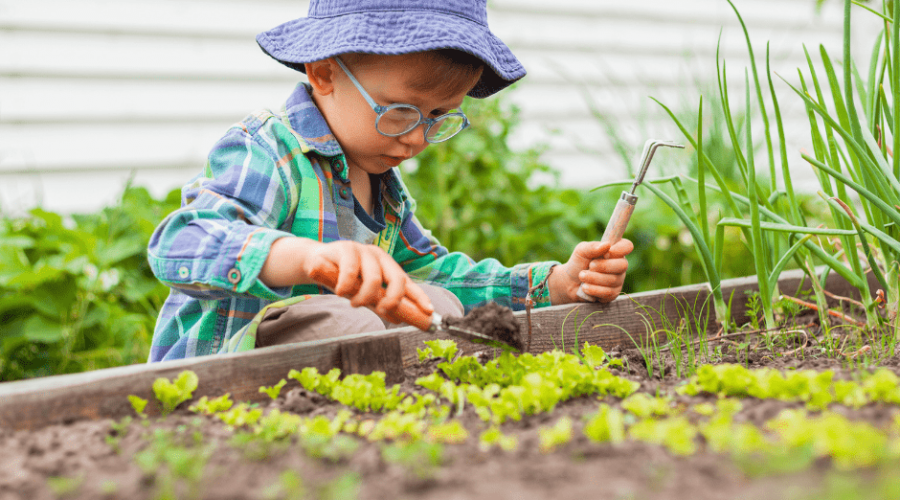In Montessori philosophy, every leaf, pebble, and breeze holds a lesson waiting to be discovered. Preparing an outdoor environment for our littlest learners is not just about creating a space—at Montessori House for Children & Elementary School, we believe it’s about inviting the wonders of the natural world to shape the minds and spirits of toddlers.
A Canvas of Exploration
The Montessori outdoor environment is a canvas where toddlers paint their discoveries with the brush of curiosity. Here, amid the dance of butterflies and the whisper of the leaves, children embark on a journey of exploration that nurtures their growth in every sense.
- Sensory Play: Imagine a child’s delight in following the path of a butterfly or feeling the texture of bark. These moments of wonder are the building blocks of a profound connection with nature.
- A Classroom Without Walls: The great outdoors offers lessons in responsibility, ecology, and biology, presented not through books but through the hands-on experience of nurturing plants and observing wildlife.
- Creative Expression: Nature’s materials become the medium for creativity, where sticks, stones, and leaves transform into art, structures, and stories.
The Riches of Outdoor Learning
The benefits of immersing toddlers in a Montessori outdoor environment are as vast as the sky above:
- Physical Well-being: The freedom to run, climb, and explore builds physical health and motor skills.
- Cognitive Growth: Nature’s complexities stimulate cognitive development, encouraging observation, problem-solving, and scientific thinking.
- Emotional and Social Development: As toddlers navigate the social landscape of outdoor play, they learn about cooperation, empathy, and the joy of shared discoveries.
Crafting the Outdoor Montessori Space
Creating a nurturing outdoor environment is a journey of imagination and intention. It’s about designing a space that is safe yet stimulating, structured yet free enough for exploration and creativity.
- Safety and Accessibility: Every aspect of the outdoor environment is tailored for tiny explorers, ensuring their safety while encouraging their independence.
- Seasonal Adventures: Each season brings new opportunities for learning and play, from the cool touch of autumn leaves to the vibrant blooms of spring.
- Engagement with the Natural World: Encouraging toddlers to engage with the environment, whether through gardening, animal care, or simply observing the changing weather, instills a deep respect for nature and their place within it.
A Legacy of Love for the Earth
By weaving the principles of Montessori education into the fabric of outdoor play, we do more than foster individual growth; we plant the seeds of environmental stewardship in the next generation.
Let’s embark together on this beautiful journey. By nurturing a love for nature in our toddlers, we’re not just enriching their childhood—we’re investing in the health of our planet and the well-being of all its inhabitants.
ABOUT THE AUTHOR – Glenda Fuentes
Glenda has a bachelor’s degree in Anesthesiology, earned while in her home country of El Salvador. In 2013, Glenda joined the MHFC Montessori Teachers team to begin her second career as a Montessori Toddler Guide. She loves working with toddler-aged children and finds their capabilities and level of independence intriguing. In June 2021, after having eight years of experience as an Assistant Guide, Glenda began working towards her AMS Montessori Infant-Toddler Credential from the Houston Montessori Center.
ABOUT MONTESSORI HOUSE FOR CHILDREN & ELEMENTARY SCHOOL
Montessori House, a family-owned and operated school since 2006, provides a continuum of Montessori education for ages 16 months through 6th grade. As an AMS Verified School committed to continuous improvement, our focus on Montessori authenticity cultivates joyful, self-motivated, and confident learners. We’re not just educating; we’re shaping future leaders. Our approach fosters curiosity, independence, and self-motivated learning, valuing the whole child—emotionally, socially, ethically, and academically. Students thrive in an environment that recognizes unique talents, providing opportunities for them to achieve their highest potential. Ideal students come from families who value holistic education, embrace cultural diversity, and have a natural enjoyment for learning and self-motivation.




